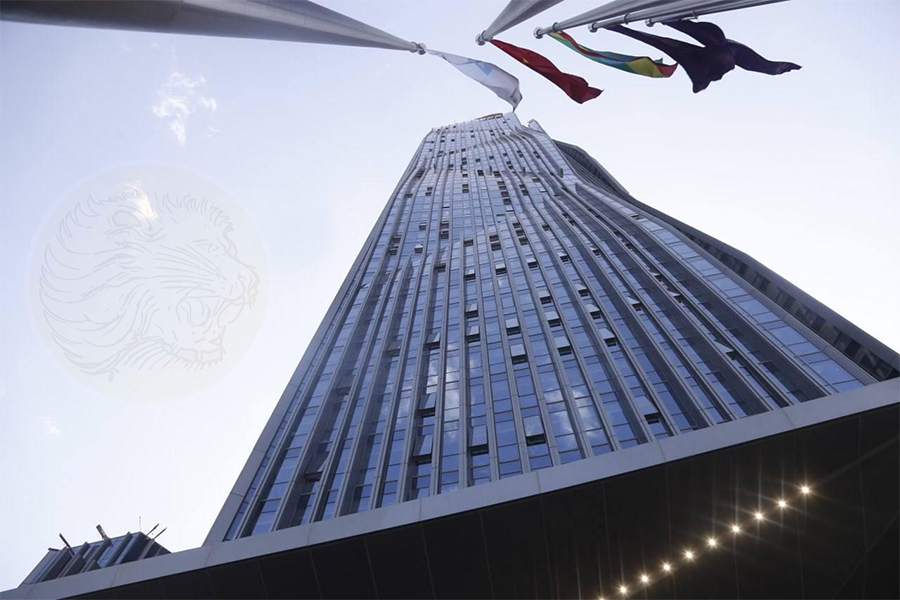
Sunday with Eden | Apr 17,2021
Mar 14 , 2020.
The first case of the Novel Coronavirus (COVID-19) in Ethiopia was reported on Friday by Lia Tadesse (MD), a day after parliament confirmed her as the new Minister of Health, involving a Japanese citizen who traveled recently to Ethiopia. The virus is here and is not just a disease of the body. It has also proven itself to be a disease to the world economy.
As capital markets tumble, companies are suspending operations and countries are banning flights even with some of their closest trading partners, the shadow of a global economic recession is looming large.
Experts warn the spillover effects from broken supply chains may lead to faltering economic activities not seen since the 2008 global meltdown. The burden on countries from an unexpected public health emergency of this scale slows down economies and eats into budgets. Significant drops in revenue from these falling economic activities is expected due to lower exports and falling tourism receipts. A decline in commodity prices and a sudden halt in capital inflows will inevitably lead to balance-of-payments crises for countries across the world.
It is estimated that the toll on the global economy will reach 2.2 trillion dollars, with developing countries sharing a little over 200 billion dollars from the shrink.
Ethiopia possesses one of the smallest economies in the world, compared to the share of the global pie. Unlike previous financial crises where the country had a heavily regulated financial sector without any involvement from foreign firms, Ethiopia is open for trade and heavily dependent on economic assistance. A fall in foreign investment, export revenues and remittances always causes significant shortfalls and tips the scale of the balance of payments.
A similar fate could visit Ethiopia today in the face of a global economy that currently finds itself in dire straits. Market failures in the developed world for the past two weeks have not been this dramatic since the period right before the global financial crisis a decade ago. Even before the outbreak of the Coronavirus, described as a pandemic by the World Health Organization (WHO) last week, economists have been warning that the global economy is due for a recession.
The trade dispute between two of the world’s biggest economies - the United States and China - as well as economic slowdowns in both countries, gave credence to the possibility of a downturn.
Citing “trade policy uncertainty, geopolitical tensions and idiosyncratic stress in key emerging market economies,” the International Monetary Fund (IMF), despite relative optimism, had revised down growth projections for 2020 and 2021. The world economy was, in fact, only expected to stabilise sluggishly, not much more.
The Coronavirus outbreak is worsening this already uncertain economic environment. Ever since it reached Italy - cases have now surpassed 10,000 in the nation with the highest mortality rate of any country - the world economy has been exposed to tolls. Combined with a crude oil war between Russia and Saudi Arabia, there is a reason for the authorities and policymakers in Ethiopia to begin to worry.
The past week opened with the United States’ stock markets falling to their lowest levels since the financial crisis of the late 2000s. The virus brought an end to the longest streak of gains for its stocks since 2009. Asian and European markets did not perform better either. Over the week, markets in the United Kingdom and Europe fell by about seven percent.
The economic headwinds have not seemed to let up either, considering the global pandemic of fear the virus has created. In the middle of last week, the United States took a drastic step to restrict travel from more than two dozen European countries. Closer, Saudi Arabia banned travel from a handful of countries, including Ethiopia.
Companies and schools in countries where the case has appeared have not taken the spread of the virus lightly either. Several major companies, including those in big tech, have begun either suspending operations or telling their employees to work from home. In Addis Abeba, International Community School, an elite private school, suspended classes and sent students off for two weeks of break.
Perhaps the most consequential measures will come from countries such as Italy. The government has put travel restrictions on its citizens, introduced curfews for restaurants and shops, closed schools, movie theatres and museums and banned all public events. This will have grim consequences for the country, which has the eighth biggest economy in the world, and by extension, the European Union and the global economy.
Unsurprisingly, economic projections do not inspire confidence. This year’s growth projections have already been downgraded by the Organisation for Economic Co-operation & Development (OECD) by five percentage points from 2.9pc.
Analysts at Bloombergput the chance of a recession in the United States within the next 12 months at 53pc, “the highest reading since the U.S. exited the Great Recession in June 2009 and significantly higher than the 24pc seen in the prior month.”
Whether or not central banks and international financial institutions can find a way to mitigate the blowback to the global economy is unclear. The IMF has deployed its rapid credit facility and rapid financial instruments to help member countries deal with the economic consequences of the pandemic. Of the 50 billion dollars it has earmarked for emerging and developing economies, one-fifth of it is allocated to the least developed countries, such as Ethiopia.
It will be a dereliction of duty if the Prime Minister’s macroeconomic team, the central bank and the ministries of Trade & Industry and Finance do not start to prepare for what may be a global economic recession.
Ethiopia is not the tiny economy the late Meles Zenawi described in 2008. It may not mean much by global standards. However, it has tripled from the time Meles was alive, surpassing the 100-billion-dollar mark in its gross domestic product (GDP), according to Cepheus Capital, a private equity firm. Fortunately, smaller economies such as Ethiopia are known to be buffeted slower than the major economies of the world during recessions.
Nonetheless, the country’s economic structure has not changed much. Despite attempting for a decade to diversify and bolster exports and address foreign currency shortages, it is still import-dependent, with two-thirds of goods export revenues generated from agricultural commodities and remains disproportionately reliant on remittances for foreign currency reserves.
The administration of Prime Minister Abiy Ahmed (PhD) has to brace itself for a possible global economic recession, or at least a severe slowdown in growth. This could be by taking cues from countries that were able to recover from the 2008 financial crisis relatively quickly.
This could come in the form of an aggressive push to bolster the foreign currency reserves of the country and by reducing debt denominated in currencies that are strengthening, which is currently the euro.
Most importantly, for a country with a central bank that failed to read an impending decline in currency reserves at the commercial banks, it would mean strengthening the technical sophistication of the regulatory institutions. De-politicising them, to meet the challenges a global economic slowdown would bring, would be a good start.
PUBLISHED ON
Mar 14,2020 [ VOL
20 , NO
1037]

Sunday with Eden | Apr 17,2021

Addis Fortune | Jul 03,2025

Sunday with Eden | Jan 18,2019

Fortune News | Jan 05,2019

Fortune News | Aug 08,2020

Viewpoints | Sep 23,2023

Radar | Jul 06,2019

Viewpoints | Jun 08,2019

Delicate Number | May 24,2025

Editorial | Nov 23,2024

My Opinion | 131974 Views | Aug 14,2021

My Opinion | 128363 Views | Aug 21,2021

My Opinion | 126301 Views | Sep 10,2021

My Opinion | 123917 Views | Aug 07,2021

Dec 22 , 2024 . By TIZITA SHEWAFERAW
Charged with transforming colossal state-owned enterprises into modern and competitiv...

Aug 18 , 2024 . By AKSAH ITALO
Although predictable Yonas Zerihun's job in the ride-hailing service is not immune to...

Jul 28 , 2024 . By TIZITA SHEWAFERAW
Unhabitual, perhaps too many, Samuel Gebreyohannes, 38, used to occasionally enjoy a couple of beers at breakfast. However, he recently swit...

Jul 13 , 2024 . By AKSAH ITALO
Investors who rely on tractors, trucks, and field vehicles for commuting, transporting commodities, and f...

Jul 6 , 2025 . By BEZAWIT HULUAGER
The federal legislature gave Prime Minister Abiy Ahmed (PhD) what he wanted: a 1.9 tr...

Jul 6 , 2025 . By YITBAREK GETACHEW
In a city rising skyward at breakneck speed, a reckoning has arrived. Authorities in...

Jul 6 , 2025 . By NAHOM AYELE
A landmark directive from the Ministry of Finance signals a paradigm shift in the cou...

Jul 6 , 2025 . By NAHOM AYELE
Awash Bank has announced plans to establish a dedicated investment banking subsidiary...